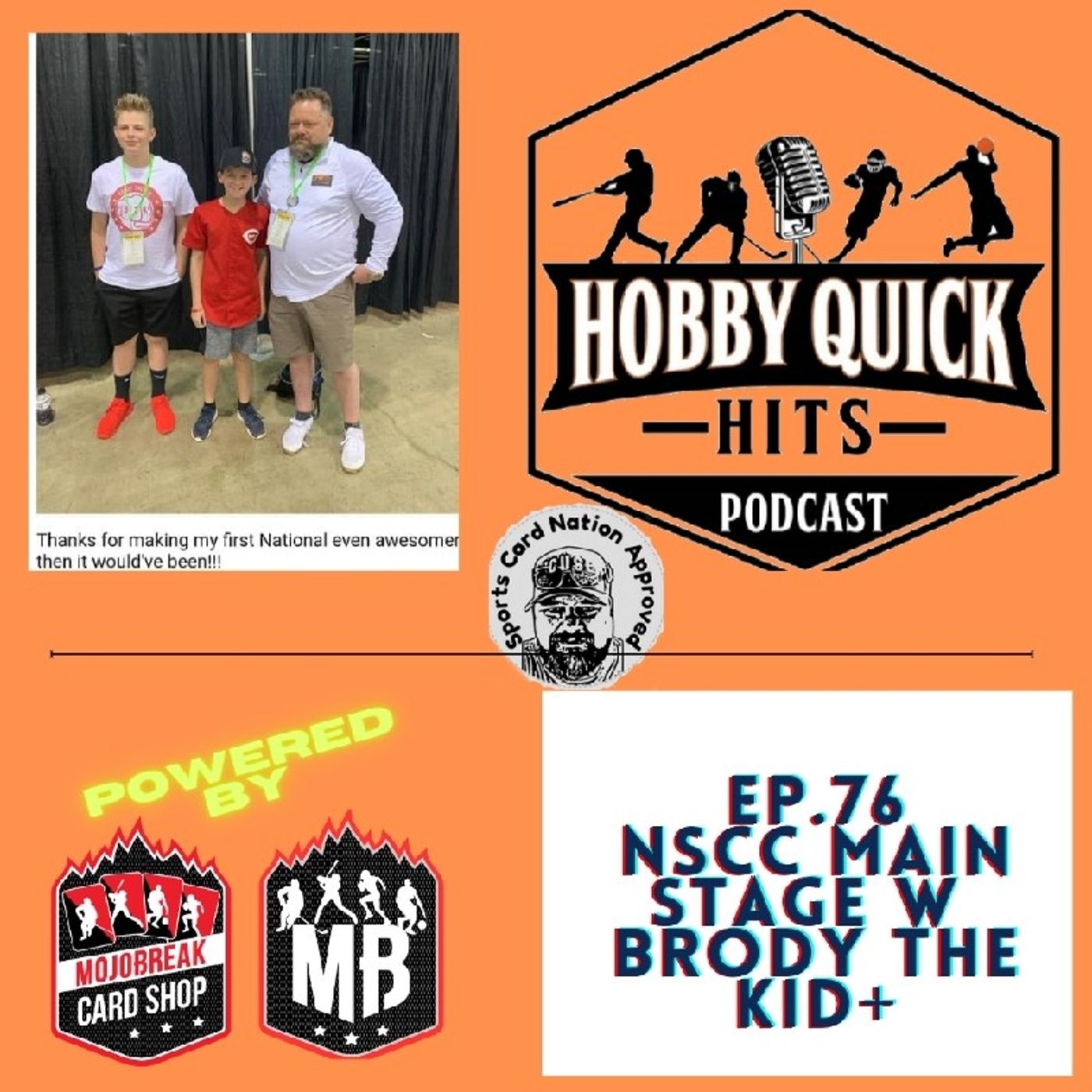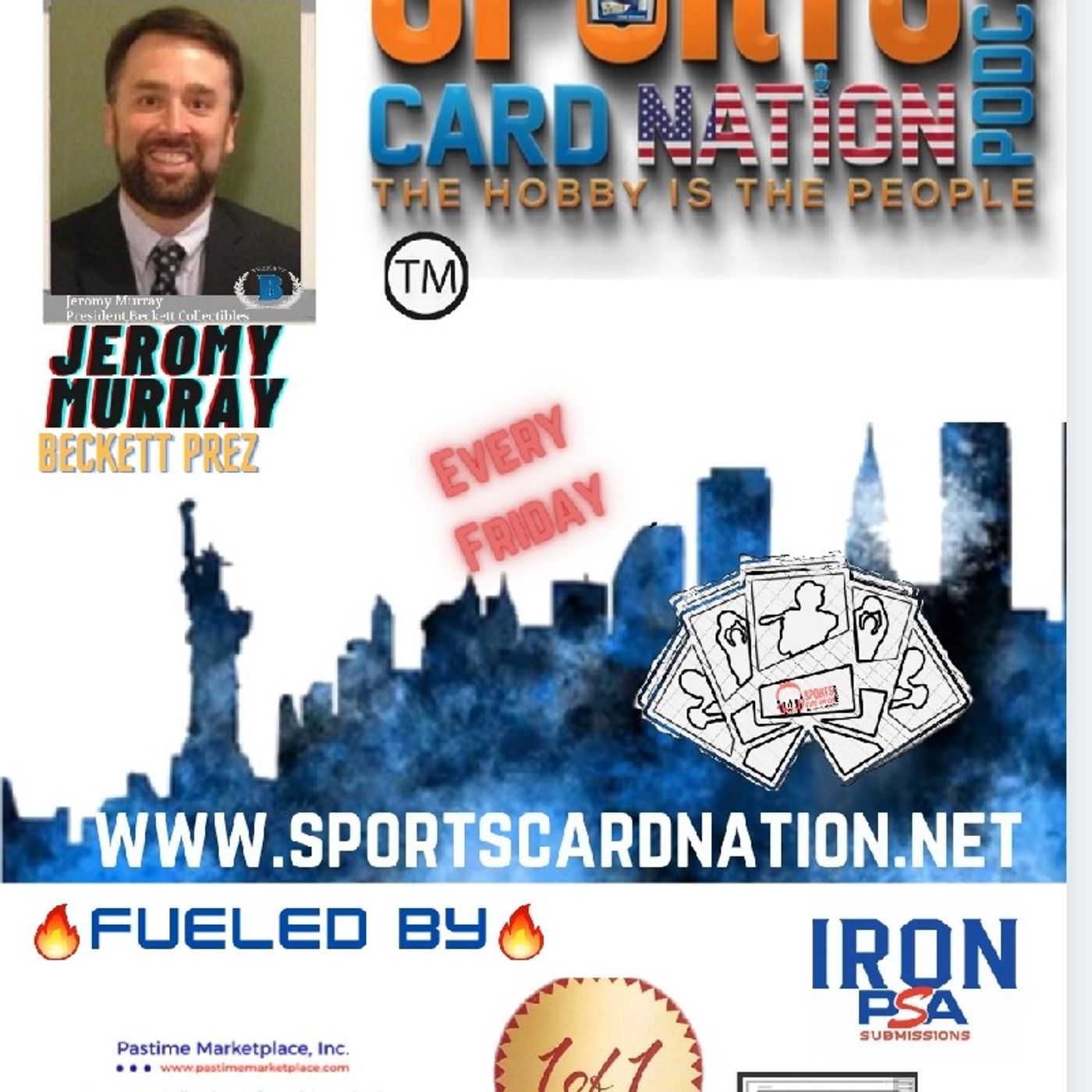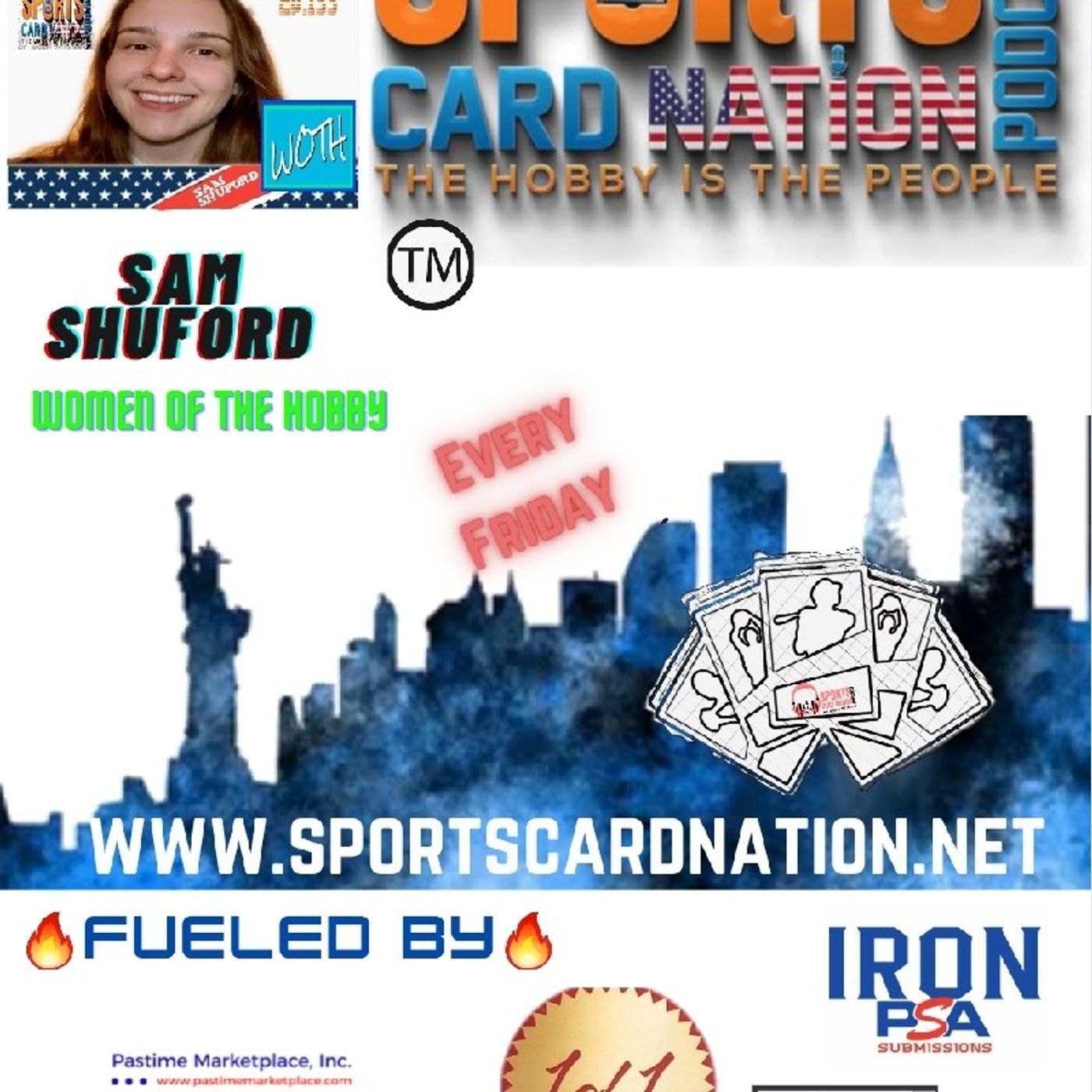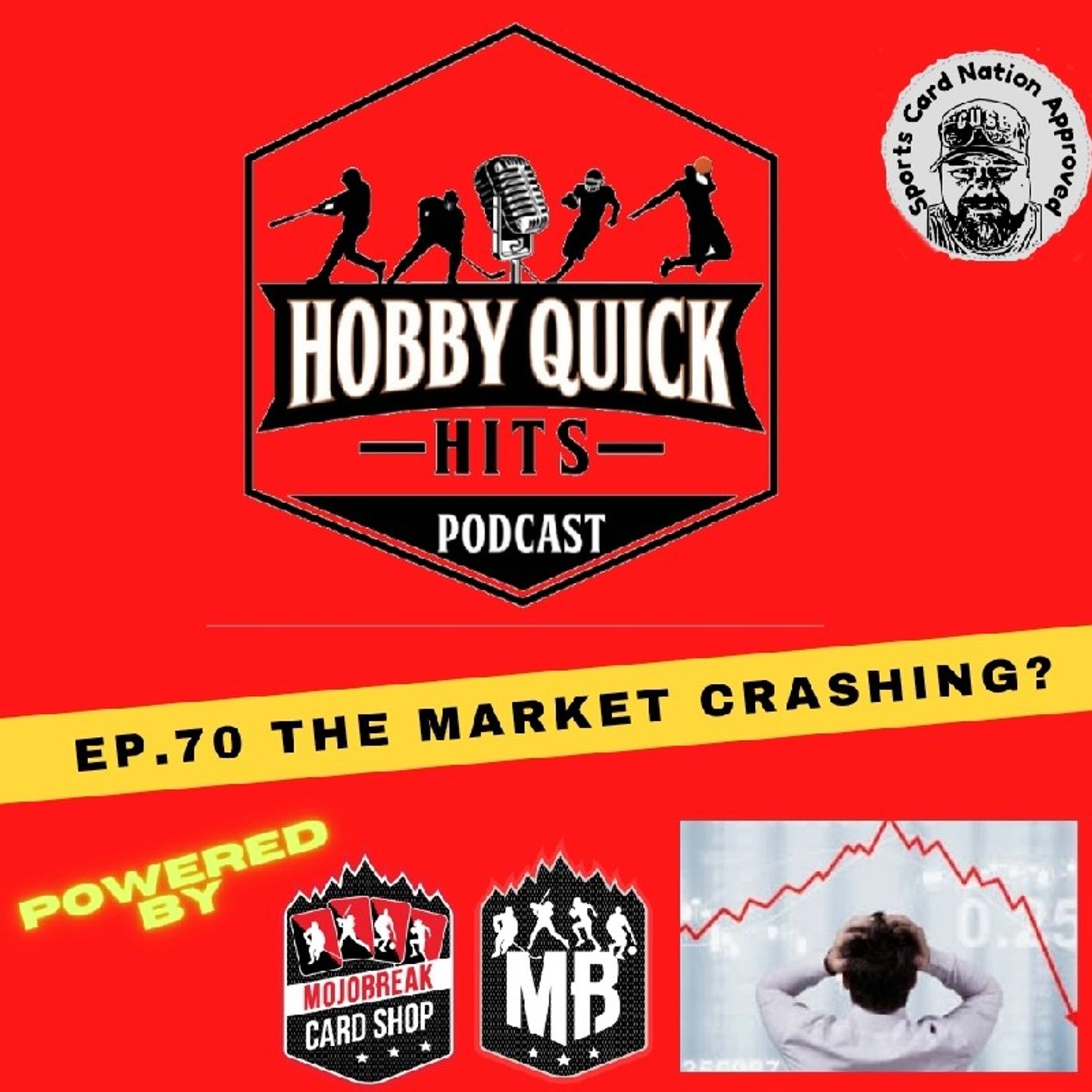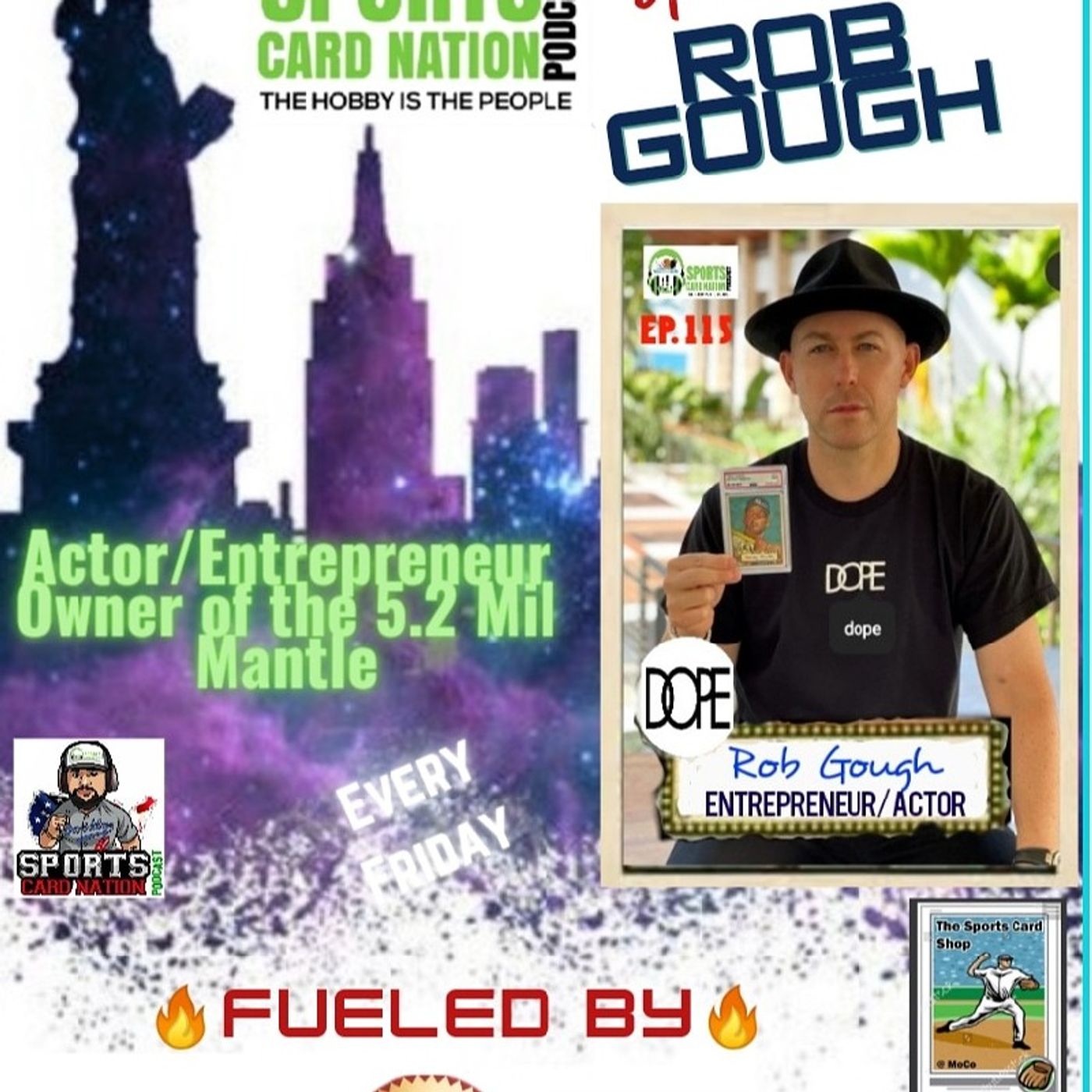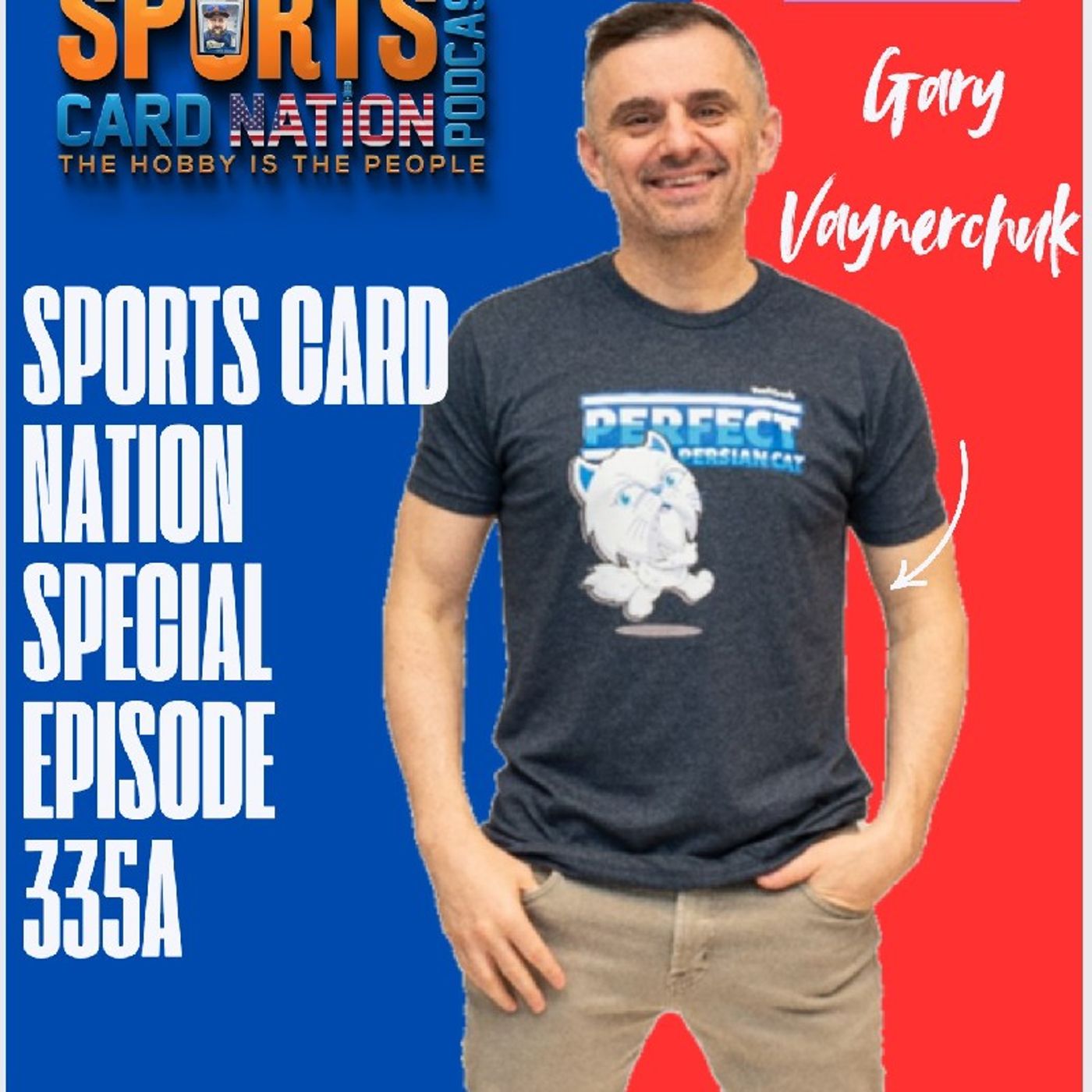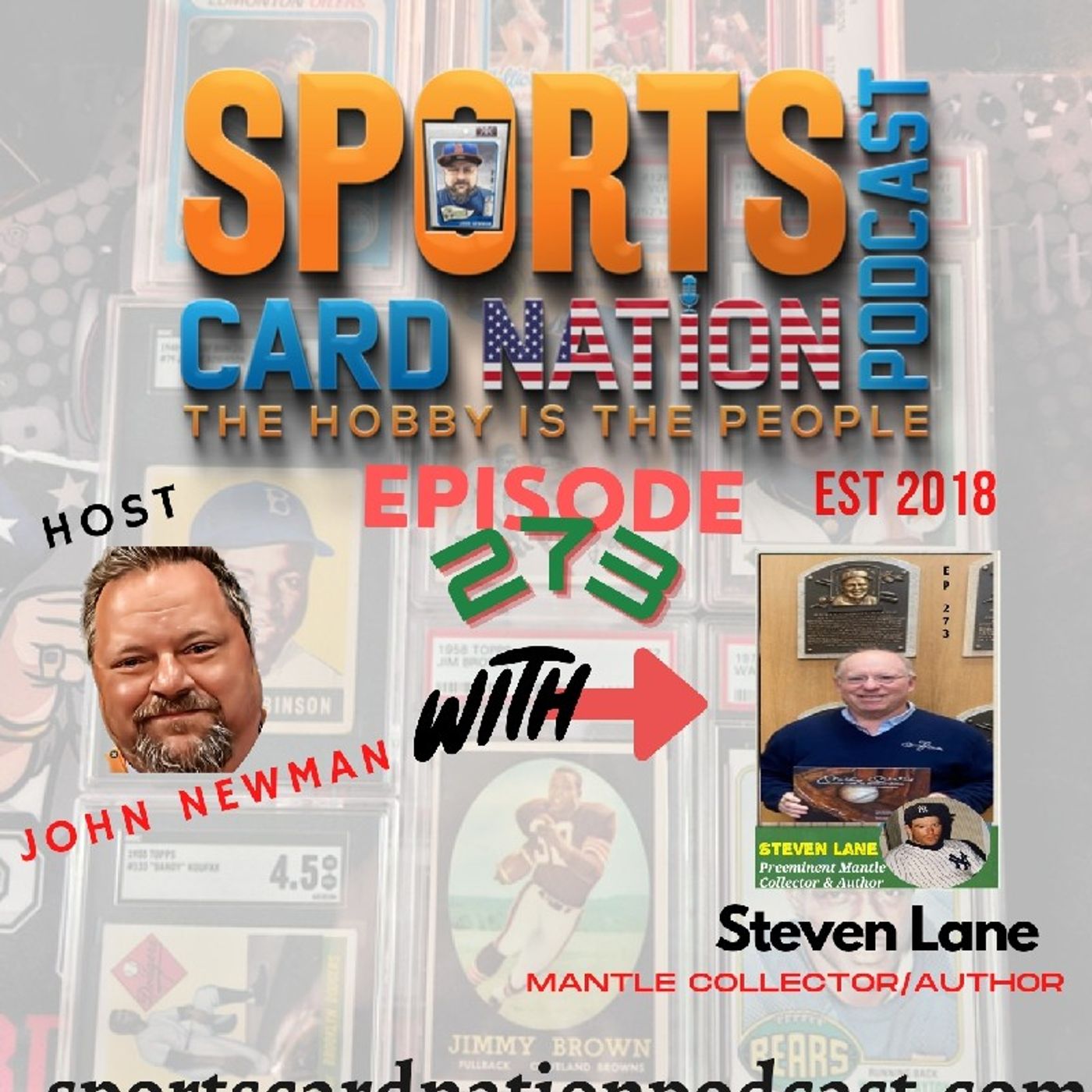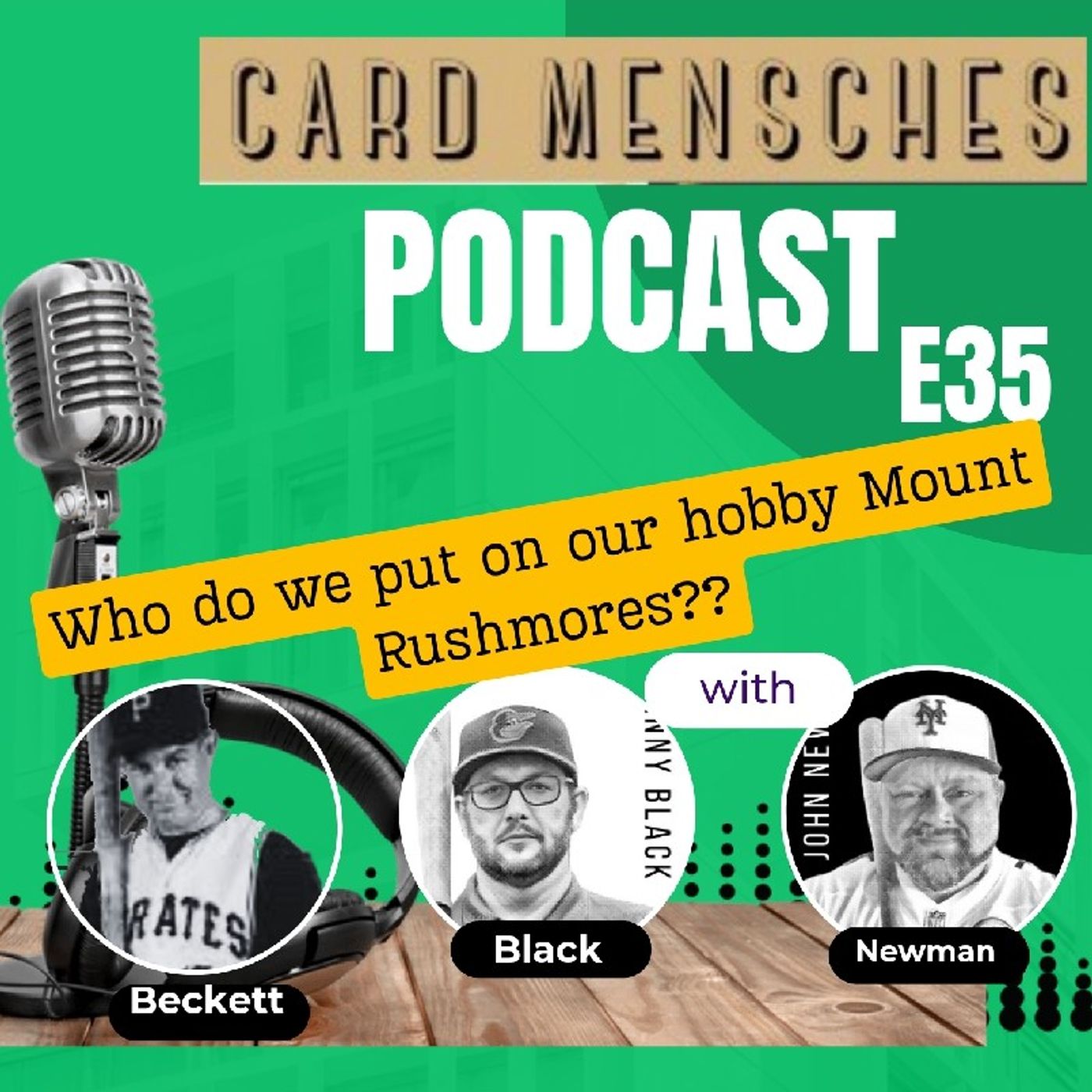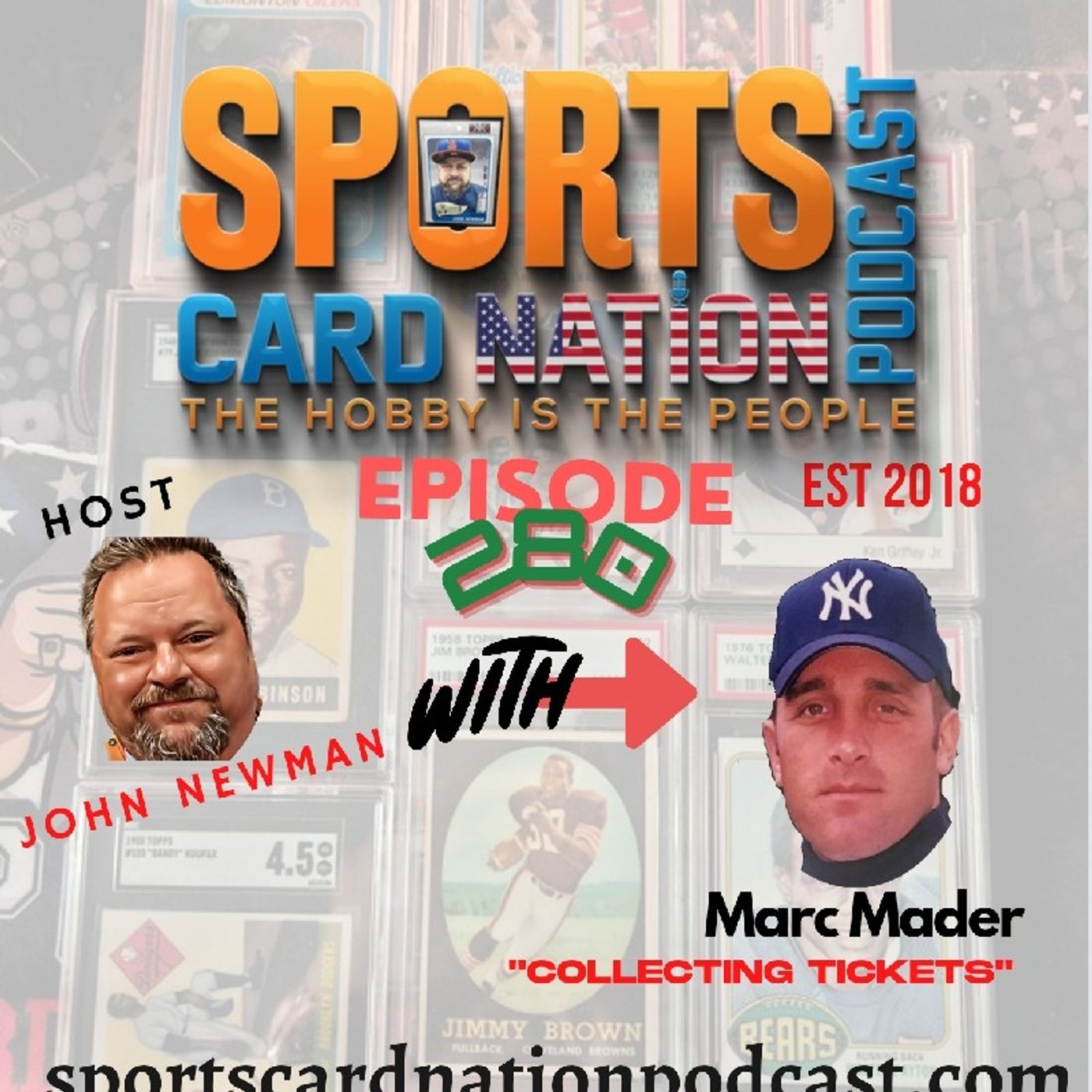Ep.286 w/Steve Wiegand/Author Part II
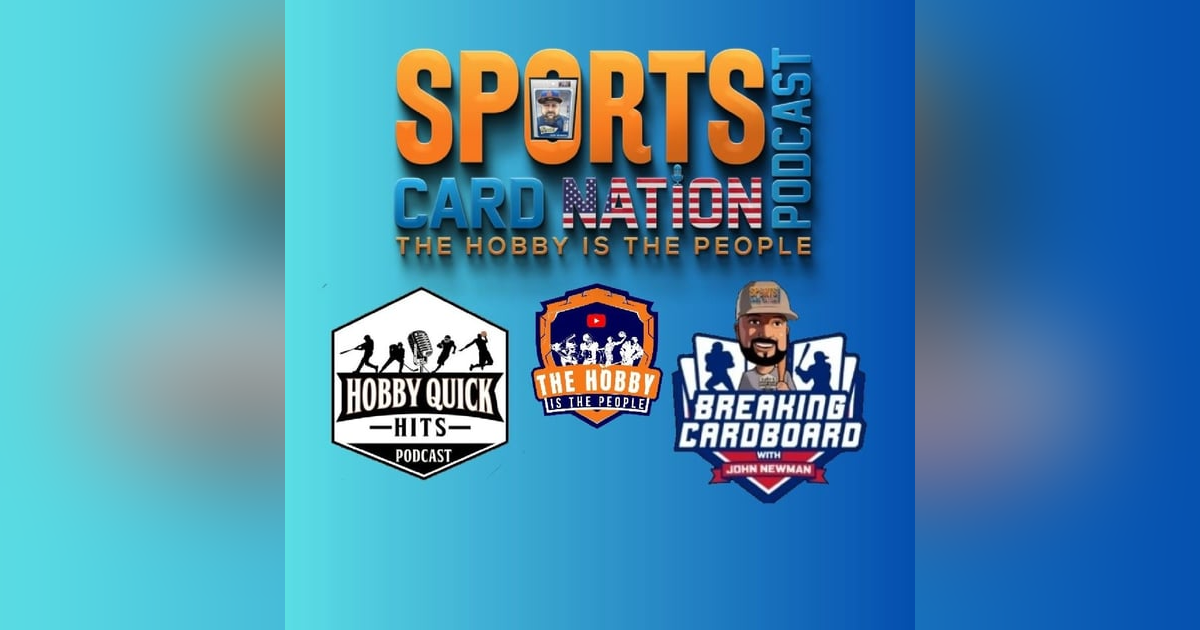
Author Steve Wiegand returns for the conclusion of our two part interview. He's written an incredible book about the late major leaguer Danny O'Connell who's stats don't jump off the page but his personality does, the book intertwines great behind the scenes baseball stories and also includes the back story of baseball cards. We talk about it!
Follow us on Social Media:
Website:
https://www.sportscardnationpo...
.com
https://linktr.ee/Sportscardna...
To eliminate pre & post-roll ads
https://www.spreaker.com/podca...
SPEAKER 1: What is up everybody? Episode 286.
SPEAKER 1: Glad to be back. Hope everyone had a safe and fun Memorial Day weekend with family. Also, you know, took some time to remember those no longer with us who allow us to enjoy those freedoms. All right, today's guest is back from last week.
SPEAKER 1: It's the conclusion of my conversation with a Steve Wigan, who wrote the book, The Uncommon Life of Danny O'Connell, which we weaves together, his career, his 10 year career in the major leagues, baseball cards and some behind the scenes stories and, it's a great book and we're gonna talk more about it, on today's episode, which is the conclusion of last week.
SPEAKER 1: So if you're listening today, this is part two and we love it. If you go back and listen to part one and if you're listening to part two, cause you're listening to part one. Thank you. As always. So, with that being said, let's get the show started.
SPEAKER 2: For nearly 50 years. Sports Collectors Digest has been the voice of the hobby, bringing you comprehensive coverage of the sports collectible industry from industry news auction results, market analysis and in depth stories about collectors and their collections. Sports Collectors digest has everything you need to know about.
SPEAKER 2: The hobby. S CD is also your leading source for listings of sports collectible dealers, card shops, card shows and the latest from the industry's top companies to check out all the latest news or to subscribe to the hobby's oldest magazine. Visit Sports Collectors, digest.com or call 1 808 29 55 61.
SPEAKER 1: All right. This is part two in the conclusion of our great conversation with Steve Wigan, author of the book, The Uncommon Life of Danny O'Connell. You know, like you said, like we, we talked about, you know, the season ended and he would do other things to earn money. One of them was public speaking. He, he, you know, he seemed to enjoy that he was a talker. I think you'd agree with that. He wasn't shy. No, not at all.
SPEAKER 1: Sometimes he probably maybe said things that I know he got kind of a little bit of hot water at different times or another for way. He, he said some things and, and, you know, maybe rub people the wrong way.
SPEAKER 1: Did that make the fact that he was, you know, outspoken or did these speaking engagements and, and had these interactions? Did that make Finding The Nuggets for the book? Did that, did that make the process easier? I know it's, it's still difficult but did that help you, in, in, in getting this book completed.
SPEAKER 3: It did because I, I, it, first of all, it, it gave you a real insight on what kind of a personality he had which, and it backed up what his kids had told me and what other people who knew him had told me.
SPEAKER 3: But there were a lot of, he was a, he was a fabulous public speaker. He was in big demand. In fact, several of his off seasons he'd have a job, maybe working for a beer distributorship or something. But usually it was, he didn't go out and peddle beer. He went out and did banquets and talked and then maybe he for the product at some point.
SPEAKER 3: And he got paid for a lot of speaking engagements when they had conventions and things because he was a very funny guy, your contemporary listeners and viewers, think of Bob Yer or a little bit older than that Joe Garagiola guys who are funny. He was very self deprecating.
SPEAKER 3: He, one time, for an example, he was talking to a bunch of little leaguers and they asked him, what was the best way to play? Second? He said, was it easy to play second base? He said, yeah, just get in front of the ball that it hit you in the chest, pick it up and throw it.
SPEAKER 3: And, and yet he was actually one of the two or three best second baseman in the league in terms of fielding. So he was very, self-deprecating, but he was also very funny and like you said, he could, he, he said what he thought he was honest and he didn't, he wasn't malicious or saying things that just to spout off.
SPEAKER 3: But if somebody said, do you think the manager could have done a better job o'connell would say? Yeah, I think he could have done a better job.
SPEAKER 3: I thought he could have used the relief pitchers better and of course, in those days, even today, but even more so in those days, managers didn't want to hear that stuff and the front office didn't want to hear that stuff. So, so he did get in trouble from time to time, but he was such a good guy and such a funny, nice human being that it never lasted because it was never done maliciously.
SPEAKER 1: Yeah. No, no doubt. And, yeah, you know, that's refreshing too. Right. Someone that kind of just calls it like, he sees it and, and, and that sort of thing and then, you know, I don't know if you agree with this and, and my take to, I, I don't think he ever played with, great, great managers.
SPEAKER 1: I mean, they were named, you know, people might recognize the names but I don't think, I don't think anyone's confusing them with, like, you know, winning pennants or World Series and, and a hall of Fame stature.
SPEAKER 1: So, you know, maybe some of those critiques and criticisms are sort of warranted based on the, the track record of some of those he played for, he just was quick to maybe a little quicker to point that out than the next guy. But it doesn't mean it doesn't mean he was wrong.
SPEAKER 3: No, he played for the managers, he played for, were the kind of guys who got their jobs because they'd been manager for some other team basically. Or they had, they were old players who had the owner of the team liked them. So gave him a shot.
SPEAKER 3: And yeah, you're right there. He wasn't playing for any Bruce Bochy or Joe Torre or other other people like that.
SPEAKER 3: And, and he was, his criticism was all, a lot of times his criticisms were backed up later on by other players generally after the manager had been fired.
SPEAKER 3: And what he was saying it beforehand.
SPEAKER 3: But those, you know, th th most of the times those things were Tempest and teapots, they didn't last very long, didn't cost him any playing time or any jobs or anything. And I'll give you a quick example. He was playing for Fred Haney and the Braves and Hay was always praising him for giving 100 and 10% and telling, telling him, telling the sportswriters how great he was.
SPEAKER 3: And at hustling and trying all the time. Well, there was a game, 11 year, one day in 1956 I think it was right. He didn't run out, he had a ground ball to the, first base to the pitcher and the pitcher threw it to the first baseman and o'connell didn't run it out. He ran about two thirds of the way down the line. Well, the first baseman dropped it, it ran up his arm and dropped it.
SPEAKER 3: And so if o'connell had run hard, he would have been safe. So he got back to the dugout and Haney said, I'm gonna find you $100 for not running that ball out. You didn't run halfway. And o'connell grinned and said, oh, come on, Fred, I ran two thirds of the way. So, so, Hay laughed and said, ok, I'm gonna find you $60 for every foot that you ran. So that was the kind of thing you did.
SPEAKER 1: So, yeah, and, and you know, I, I mean, it's all speculation. Do you think if he would have had, you know, play for maybe a better quality of, of manager or managers? Do you think his career would have been any different? Or do you think it not necessarily.
SPEAKER 3: I don't know about the managers, but I think his career would have been and maybe this is the managers because they made the decisions if he'd have been able to stay at third base.
SPEAKER 3: If he, they said look, you're a third baseman, you're gonna play third base, you're gonna play it like, Ken Boyer or, or Greg Nettles or o or Arnao, and you're gonna be a third baseman. I think that would have solidified his, he would have made him more confident as a hitter because he wasn't trying to learn a different position.
SPEAKER 3: And I think that would have been a, a real boost for him.
SPEAKER 3: But that's again, that gets back to what you said about the managers because that was the manager. They, they had a hold of shortstop, they moved him to shortstop, they had a hold of second base, they moved him to second base. And then, you know, criticized if he made, it didn't learn how to turn the double play the first week. He was there. So, I think that was a, that, that probably hurt him. Somewhat.
SPEAKER 1: Yes, stability is important. Anyone who's played sports can tell you if they've had to switch positions.
SPEAKER 1: You know, it can be difficult. You, you, you're seeing the balls off the bat at a different angle, you make a great point with double play turns change, you're, you're now in a different position, you're catching the ball in a different spot, pivoting a different sort of way. And like you said, he pretty much went right around the infield from third to short to second.
SPEAKER 1: And, and back again at, at different times, you know, reading the book too. He played for temperamental sort of managers where you get an oh for, you get an zero for four day and they immediately, like you sat for a whole week before you saw the field again. Yeah.
SPEAKER 1: And that's, that's a tough pressure to play and like thinking, man, if I don't have a, a halfway decent day today, I might be not playing for a week or potentially more. I think that makes you nervous. And that's a, that's not a comfortable situation to be in.
SPEAKER 1: Then he was a, there's a story as your book points out, there are other players that played in front of him where they had too long of a leash and like you, you know, he had the better player watching rather than playing. And so he had some, some of that sort of adversity that didn't help his matters, but yet again, strong, strong, 10 years in the big leagues based on some of those other intangibles.
SPEAKER 1: And, and, and whatnot from when you decided to, to that he was the subject of your book to its completion. How, how long of a process was that for you?
SPEAKER 3: It was probably about where I was actually working on the book. It was probably a little less than two years.
SPEAKER 3: I had, I sold the idea to my publisher, which is Bancroft Press. And they said, yeah, ok, we, we see what you're going with it. So go ahead and do it. And I got the contract and then it was a matter of, I looked at his career, I went through, you know, his career kind of cursory at first and then talk to his kids, talk to a few other people.
SPEAKER 3: And then I thought, you know, you gotta flush this out with, with more than just his. And in 1955 he did this and in 1956 he did this and I've gotten on to the whole idea of him in the first place from cards, from looking at cards.
SPEAKER 3: So I wanted to kind of look at the history of cards and I wanted to throw that as an element and then I wanted to put in the kind of what the situation was while he was playing because they didn't, they made a fair amount of money compared to the average American in the 19 fifties. But there was, they had, they were totally the, that they were slaves. Basically. They couldn't, he, he was playing with the Pirates.
SPEAKER 3: He couldn't end his contract at the end of the year and then go to another team. He could be traded without any say at all. He, the way it worked in those days if you were cut and you had signed a contract you got a 30 day paycheck and a train ticket home. That's, that's all the security that you had.
SPEAKER 3: So I wanted to put in the fact that, you know, this is what was going on in the country at the time. He lost two years. He, he was, he was, he finished third in the rookie of the year voting in the national league in 1950 1951. He was drafted and he missed all of the 51 and 52 seasons.
SPEAKER 3: So, you know, there he is right at the start of the very start of his career, very promising and he loses two years. Now that happened to guys like Maze and, and other people as well. But still, it's the kind of thing that, that today's players don't face. And and so that was one of the another another sword over his head, I guess.
SPEAKER 3: So in terms of looking for through the book, the, the fun, the fun thing and the unfun thing was, and your younger viewers and readers, listeners won't maybe relate to this. But when I was a kid, one of the great joys of base of a newspaper was going through and looking at the box scores and you'd pick out players and you follow what they did and you'd read the little summary of the game.
SPEAKER 3: I went through every box score of every game that he played in for 10 years. And that meant spending three weeks in the Milwaukee Central library because their newspapers weren't online at the time. So that means going grinding through their, their system to look at every box score. And, it was fun, but it was also not fun at certain times.
SPEAKER 1: So, yeah, it was a grind. It was a grind. You mentioned the grind grind, right?
SPEAKER 1: You know, in, in today's digital age where everything's almost at your fingertips to do it the old school way and I'm old enough, Steve.
SPEAKER 1: I, I, you know, I, I, we got the local games being in New York City Yankees Mets and, and that sort of thing, but anyone else, you had to get that, that paper the next day and, and read the box scores and like you said, yeah, we had our favorite players even on another team that we were a fan of, but we were fond of the player. And so what here? And you talk about that?
SPEAKER 1: I know I lived it so I know exactly what you're talking about doing it in the moment is funner than having to do. Go backtrack and do it, you know, 10 years worth all in kind of one sum. So that's a whole different, that's a whole another show. Was there any moment? I mean, the books out?
SPEAKER 1: Were there any moments where you yourself, you can say this now, like, did I pick you know, am I, am I barking up the wrong, the right tree? Did you, did you second guess yourself at any time or, or not? Really?
SPEAKER 3: Oh, yeah, this is my 10th book. And, there's always, there's always that moment at least once. And in this one it was, you get about halfway through his career and he hit kind of a low point. And you said, ok, I've already said that he's a, he's a great fielder. I've already said that he has all these intangibles. The guy hit in 239.
SPEAKER 3: You know, what am I gonna say about the guy? And that, that became a little bit of a, at that point, I thought, you know, I really not may not be able to, to justify this. I may, I mean, it may be that somebody is gonna get halfway through this book and say so this is it, he never does anything dramatic. He never saves the, saves the pennant or does anything like that.
SPEAKER 3: But then you get over that and then when the finish line gets inside, you start getting excited about it and you know, you start thinking about what, what is, what does this all mean and how does it wrap up? And I'll tell you a story, John, it's a little bit off the point but no, no, go ahead, go ahead in 1989.
SPEAKER 3: I was covering the World Series between the Giants and the A's and I was down on the field before the game, the first game and the Giants had a pitcher named Bob Neer who had come over from, he had a pretty good career with Houston. He'd come over and he was told that he was getting up there and, and it was either his last year or next to last year. And I don't even think he was on the active roster for the Giants.
SPEAKER 3: And so I was talking to him about the importance. It was his first World Series and I was talking to him about, you know, how did he feel about it? And he brought up, he said, look, he said this is what you play for. I don't care, you, you sign the contract and you argue with the guys about whether you should get more money and how many walks you had and what your earned run averages was.
SPEAKER 3: And, but you really, when you get on the field like this, this is what you're here for, is to play a game and play a baseball game and you pinch yourself all the time thinking I'm, I'm got a uniform on and a glove and I get to play a kids game and I get paid for it and this is, this is terrific and, and, and I thought that sort of caught the whole idea of and maybe it's been lost a little bit.
SPEAKER 3: I I certainly hope not but it's, it's been lost a little bit in both watching, being a baseball fan and watching the game and in card collecting and, and, and I'll get on my soap box here a little bit and I sound like an old fart for doing it.
SPEAKER 3: But I, I watch, from time to time I watch YouTube videos of maybe a pack opening or somebody is, just bought a box at a goodwill and they're looking through them and I was watching one the other day, the guy was going through the cards and every card he went through, he mispronounced them. These are cards from the fifties, sixties and seventies.
SPEAKER 3: He mispronounced the name. I mean, grossly mispronounced, the name didn't have a clue who the guy was. And when he got to Carl Ostrem, Sy, he didn't know it was clear, he didn't know who Carl Ostrem was, other than he had a list there of the, he had a, a Beckett or, some kind of list of who was a valuable card from that year.
SPEAKER 3: And, but, you know, here he is with the Hall Of Famer and, he doesn't know the guys. He doesn't, he clearly didn't know who the guy was. And AAA as an old guy, it's a little troubling because you can pick up any pack from today or 50 years ago.
SPEAKER 3: And there's a story behind the picture on each of those cards and it's, you know how this guy, like you said before was the star athlete in his high school and maybe three sports dominated in baseball, maybe, went through three years in the minor leagues where he was a star gets to the majors and that's it. He peaked, he maybe has two or three good years. He's up and down a little bit and he's gone.
SPEAKER 3: But the rest of his life he's gonna say, yeah, I was a big league ball player and you know how many of us who like baseball or love baseball can say that that we even got anywhere close to that. So I ho I hope that people read the book and they pick up on, they pick up on the fact that there was nothing wrong with being a 260 life time hitter and when, if you enjoyed what you did, you did and you did the best you could.
SPEAKER 1: So, yeah. No, and the book is, is great at, at, but like you said, it's, it's, you know, the, it says the Taylor baseball card, average players of the true value of, of America's game and you, you weaved all of that stuff together. So, well, Steve and you know, we always want, you know, people wanna talk about those stars but you know, don't, you can't have a whole roster of Mickey mantle, right?
SPEAKER 1: You needed though, you know, or Willie Mays, you needed those other role players, those utility, utility guys, those semis stars, if you will, those intangible guys, those hustlers to fill out the roster and sometimes I don't think they get enough credit. And the, you know, it's easy.
SPEAKER 1: The low hanging fruit is those superstar stars and, and, you know, it's, I, I, I'm with you when I see, you know, Kresky is a Hall Of Famer. You really should probably know the name, almost at any age. I mean, unless you're very young, I get, I get that. But, you know, I, I, that's one of my pet peeves in, in, in sports and life and in the hobbies is not, I'm a history guy.
SPEAKER 1: I love history a, across different genres that, that world history, but sports, history card history, that's just my thing. And so one of my pet peeves, it might be, it might be a little unfair is when someone else doesn't sort of respect that or, or realize that everything is the bridge to the next e whether you, you'll, you like it or not.
SPEAKER 1: Without, we wouldn't be where we are today without, without what happened yesterday or five years ago, years ago. And so, yeah, that, but that always is a, a pet peeve of mine too. And again, you do a great job of, of highlighting it. The book is what it is about Danny O'Connor. It's about baseball. It's about sports.
SPEAKER 1: It's about the, the struggle to, to stay at that level, and fight and claw and, you know, in the off season to fight and claw to, to pay the bills and get to the, the next season. And, and I don't think we, that's talked about enough, you know, again, and I, I, that's one thing I loved about, what you did.
SPEAKER 1: And again, even some of the, the bubble gum wars with the cards and Bone and cops, you, you interweave that in there, which is very important because that, that, that's, that's part of the fabric, a as well. At that time and, and, you know, you talk about, you know, you know, getting lots of Danny O'Connell cards and not as many Willie Mays and, and who, who, you know, you didn't realize it then. But it, it led to this book.
SPEAKER 4: You are listening to the Sports Card Nation Podcast.
SPEAKER 4: We'll be right back after this break. Hobby Hotline is the hobby's only live interactive call in show. Join some of your favorite hobby personalities every Saturday 11 a.m. Eastern 8 a.m. Pacific to discuss the hottest hobby topics. If you miss us live. Catch us after the fact on all major podcast platforms. Follow us on socials at Hobby Hotline.
SPEAKER 1: We, batch talk about, you know, coming down the home stretch here, kind of talk about your hobby as a kid and where those, where those car I know I spoke to you before we, we hit record but kinda again, speak to like your collecting background there.
SPEAKER 3: Well, I started II I was, I was living, I, I grew up in San Diego but for a couple of years when my dad was Overseas in the Navy, I lived in Monterey, near San Francisco.
SPEAKER 3: The Giants have to come to San Francisco. The year I first started thinking about baseball. So I was a big Giants fan and we moved to San Diego. I was still a Giants fan. Baseball cards. Kind of caught my attention. About the same time I started getting an allowance from my parents and I thought, oh, I got this, I got a quarter every week here. I can do something with this.
SPEAKER 3: So I would go up and buy, you know, a Coke or a candy bar or something. And I buy a couple of baseball card packs and it kind of took off from there. That became my hobby. I wanted to get as many baseball cards as I could and I did all the things that everybody else did at that age. We did flipping, we did, flipping against the wall. We did, flipping to see if they came down odds or evens. We traded cards.
SPEAKER 3: I took all my Dodger cards and put them in the spokes of my bicycle.
SPEAKER 3: Much to my regret now because I think there was some Sandy Koufax and Don Drysdale in there. But, but I was a Giants fan. So, so I, I collected for God till I was in my early teens, I think. And then guess what happened to him? I found out about girls and they all, all my cards went to the kid next door who was eight or nine years old.
SPEAKER 3: And, then I started again in the, I wanna say in the early eighties when interest kind of took off. Like, the, there wasn't just tops anymore, you know, there was upper deck and there was other manufacturers putting cards up and I wasn't so interested in those. I was more interested in the old cards.
SPEAKER 3: So I started collecting Giants cards tops Giants from 51 the first year you to through the early two thousands, I guess. And, that's basically what I did and I'd go to card shows and I, you know, look for, I didn't really care about condition. I wasn't looking for, you know, a PS A eight of, Felipe Lou or somebody.
SPEAKER 3: I just wanted to complete the set and, that's what I did. As I got when I retired from newspapering and we moved from California to Arizona. I had a good friend who had two grandsons who were 789 years old, avid little leaguers, avid baseball fans.
SPEAKER 3: And so I gave them, I took out a few cards so I still probably have maybe a couple of dozen cards.
SPEAKER 3: And by the way, I've got about 50 m, Danny O'Connell Cards if anybody is interested.
SPEAKER 3: So, so I gave, I gave my, my collection to them and I was really pleased that, they continued, there were cards I was missing and they were continuing to save their allowances and try to complete their card set. So, anyway, that's what happened to him and that's, that's what I think should happen to them.
SPEAKER 3: I think if you're a card collector and you're no longer active in it, find somebody, you sell them if you need to. But if otherwise find some kid who needs to get into the sport, heading into the hobby and, and collect cars.
SPEAKER 1: Yeah, and pass that baton and, and that next generation behind us that are gonna carry that, that Torch, forward and, and, and so on and, and so on. That's, that was nice to, Steve and, you know, hopefully that's, that's a story that will continue. And that's how we, that's also how we remember these players sometimes right through, through cardboard. Right.
SPEAKER 1: I mean, there, there's, I remember even as when I was a kid, you know, getting a card of a player, I hadn't heard of it. Sort of like, who's he, what's he about? What kind of year did he? And you start learning more about him, you know? And back then you very well know too, cops put those cartoons on the back that talked about some of the off the field stuff, you know.
SPEAKER 1: So, so, and so does this in the off-season. So, and so the, you know, collect stamps or, you know, in his spare time we learned about the person behind the uniform. That's right. The, the stats. And I, I think that's, that's important. And, and again, Danny O'Connell was a, a man beside a baseball player in that book, talks a lot about that.
SPEAKER 3: And it's funny you talk about the cartoons though that, I used to laugh as I was collecting as, as an adult because you could generally look at the little cartoon on the back of the tops card and you could tell how good the player was because if he was really good player, it would say something like Eddie was made his fourth All Star team last year. But if he wasn't good, it would say John enjoys bowling in the off season.
SPEAKER 1: It's a great point. That's, that's how you g what, what level, you know, you know, Mickey won the 1953 W MVP. He said, you know, Mikey likes to garden, you know, so, but it is a great point and, and, but it's also, you know, I used it as a, as a younger kid when those really were in full force.
SPEAKER 1: I used it to learn sort of about these guys off the field as well, is on and, I, some of that I think is lost but you, you mentioned this or I think it's a little bit lost in today's game and, and today's collectors are fans but, you know, there's, there's still people who care and, and, and research that stuff, and not writing a book as well. And, you know, you know.
SPEAKER 3: I, I tell, I tell, I'm sorry, I know, I tell collectors who maybe guys are buying wax packs or maybe the buying sets and you get a common card. Now you never heard of the guy who plays for, you know, some team you don't follow, do yourself a favor and, and we can do it.
SPEAKER 3: Now with the Web Google, the guy, you'll find a wi there's, I guarantee you that his parents or his girlfriend or somebody has put up a, a Wikipedia article on the guy and you might find out that, hey, he went to your high school or maybe he likes to surf in his off season and you used to like to surf in the off season.
SPEAKER 3: You'll find something interesting about the guy and that's, maybe it takes a little of the Sting out of getting a pack full of commons or, you know, nothing that's, you know, particularly interesting or valuable.
SPEAKER 3: But it would certainly, it will really extend your, your interest in the game, I think as well because then you're watching the guy play against your favorite team, you say, I know that guy, I, I know something about him.
SPEAKER 1: Yeah. Bring that human element back into these, you know, they put their pants on. Well, they might be better, baseball, football, basketball, whatever sport players than us. They also put their pants, on one leg at a time And, you know, I think it's important to, to, to, to know that and, and learn about it. Your, your book does a great job, for those, if you haven't read it yet, you know, Common Life of, of Danny O'Connell.
SPEAKER 1: This is not just the boy I want, I know I've said this numerous times because it's important. What is about Danny O'Connell? There's much more going on in this book. You got a lot of behind the scenes, baseball stories, a lot of anecdotes. You've got the, you know, the Bay for, for hobbyists, you've got the baseball card element, in there as well.
SPEAKER 1: It's a great, like I said, I had a hard time putting it down in a couple of late nights where I stayed up a little later than I, I probably should have. Before I, before I, you know, we close it out. I, I guess, you, do you see another, I know you're writing two books, you said, concurrently you think you'll come back to the sports arena with, with a book somewhere in the future, you think it's somewhere you wanna go again?
SPEAKER 3: I, so I, I do think I actually had an idea just recently for another baseball oriented book.
SPEAKER 3: And so I'm gonna explore that quite a bit. As I move on down the road.
SPEAKER 1: Well, I, I, I'd love to see it. Again, this book was, was tremendous and, and like I said, I'm, I'm not always a voracious reader, but this one made me a voracious reader because I was, you know, I was like, I want to find out what happened now or what's next and especially when you don't know about a player, right? We know a lot of the a lot about some of the bigger names.
SPEAKER 1: This, this was almost more interesting as crazy as that might might sound Steve, I wanna give, you know, I always give the guest sort of the final word where people can find a book, purchase the book, your other books, websites, social. I mean, anything you want to share with those listening out there, take all the time you need and, and get that information. Ok.
SPEAKER 3: Well, not much. The, the book will be out in hard cover in the middle of July. In fact, the the release date is set for the day of the All Star game this year.
SPEAKER 3: So it will be out in hard cover from Bancroft Press and you can buy it from Amazon or Barnes And Noble or any place you can buy new books. If you, Google my name, or go on Amazon and do my name, you'll find it and all the other books and you can order an advance copy if you want to.
SPEAKER 1: Yeah. And, and if you follow me on Social Media, make sure to let me know Steve, I'll, I'll gladly retweet, get that word out there. And ok, great.
SPEAKER 3: I appreciate that.
SPEAKER 1: Someone who's read the book and know what, know, know what it's about and how interesting and important it is. You know, clearly I share that so other people can be enlightened as well. Well, I appreciate you, you coming on making some time for us and again, great book. Again, read it rather quick. That's always a sign to me that I'm enjoying it, the book that I, I'm sort of forcing myself to read.
SPEAKER 1: Like I gotta read another chapter usually that's a school book. But I remember those days but no awesome book. And I appreciate you, you coming on and sharing some of the behind the scenes to, to how a book comes together and some of the, the processes and difficulties everyone thinks it's, you know, I just start writing stuff. It's, it's not as simple as that so.
SPEAKER 3: Well, thanks John. I appreciate you having me on and I really enjoyed our talk and hope people buy the book.
SPEAKER 1: Yeah. No, no doubt. Like I said, we'll we'll get the word out there for sure. Thanks. Great. Thanks Sean. All right. That concludes our conversation with Steve. I wanna thank him for allowing me to read an advance copy of that book and then coming on the show and, and talk about it. It's a great read. If you're a baseball fan, even a card collector and a semi bases fan just, it was super interesting.
SPEAKER 1: I had a hard time putting it down at the times that I did got through it quickly because I, I wanted to see what was going to happen next. I learned a lot about Danny O'Connell and those guys were so, like I said, during the interview, so important to the fabric of the game, you know, you can't have 26 Mickey mantle on a team.
SPEAKER 1: You, you have to have those guys that fill those roles and a great defensive player as well. And that book is gonna come out around the major league baseball all-star break. So go pick up a copy and look at the blurbs. You might see a familiar name on that as well. So, with that being said, we're gonna hear from our hobbies, the people announcer, some closing thoughts and put the bow tie on this week's episode.
SPEAKER 5: Time for our hobby is the people announcer of the week.
SPEAKER 6: Hello, we are Rory Annie and we are leg.
SPEAKER 6: Please remember the high is the people.
SPEAKER 5: If you'd like to be the hobby is the people announcer of the week, do a WAV or MP3 file and send it to Sports Card Nation PC at gmail.com.
SPEAKER 7: That's a wrap for this week. Huge. Thanks to you, the listeners out there because without you, there is no ice.
SPEAKER 7: If you like the show, we truly appreciate positive reviews. Big ups to our great guests who drive the show and our awesome sponsors who make it all possible. Sports Card Nation will be back next week but don't forget to catch either hobby quick hits or cod mens coming up on Monday.
SPEAKER 7: I'll leave you with this.
SPEAKER 7: How do we change the world?
SPEAKER 7: One? Random act of Kindness at a time.
SPEAKER 7: Remember the hobby is the People.
SPEAKER 8: Hobby News Daily is your home page of the hobby providing original writing, exclusive gem rate data. A daily morning minute podcast and some of the best content creators in the hobby. Remember, hobby news, daily.com and at Hobby News Daily on social happy collecting.
SPEAKER 9: Iron sports cards is your number one source for all your PS A and other grading submissions. Their elite status improves turnaround times. Heck, they even provide the card savers. Their chat rooms provide updates on all your submissions.
SPEAKER 9: They also offer wax options and single cards to cover all the bases. Check them out on Facebook at Iron Sports Cards Group or on the web at Irons Sports cards.com or even give them a call at 1877. Ironps A Rob's got you covered.








